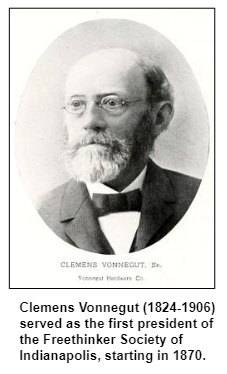Jun 14, 2019
(June 8, 2019) During the 19th century, Germans became the largest European ethnic heritage group in Indiana. In 1870, immigrants and German-Americans in the state's capital - including some of its most influential residents - formed the Freethinker Society of Indianapolis.

They included Clemens Vonnegut (1824-1906), the patriarch of a family that, for more than 110 years, owned an Indianapolis-based chain of hardware stores that he founded in the 1850s. Beginning in 1870, he served as the first president of the Freethinker Society of Indianapolis. During our show, Justin will describe how Clemens' freethinker beliefs influenced his great-grandson, literary icon Kurt Vonnegut Jr.
Other key figures in the Freethinker Society of Indianapolis included its co-founder, Herman Lieber, who immigrated from Germany in the 1850s and became the patriarch of an influential, multi-generational Indianapolis family. Lieber opened a small frame shop that became one of the most respected art dealerships of its era, employing more than 200 people.
According to Justin, the Freethinker Society was "one of the city's first non-religious organizations and facilitated freethought ideas and practices through educational lectures and social gatherings." At the society's events, these "philosophical radicals" discussed such topics as science, women's suffrage, socialism and theology.

In a blog that Justin wrote for the Indiana Historical Bureau, he notes that, in Kurt Vonnegut's semi-autobiographical book Palm Sunday (1981), he describes his great-grandfather's freethinking as the novelist's own "ancestral religion."
Clemens Vonnegut, Herman Lieber and others in Indianapolis - as well as German Americans in other cities during the late 19th century - were influenced significantly by Karl Heinzen, a Boston-based freethinker. In 1882, Heinzen wrote Separation of Church and State, a widely distributed book. He traveled to Indiana several times and became a professional colleague of Lieber, according to Justin Clark.
All of them, in turn, were influenced by Robert Ingersoll (1833-1899), an orator known as the "great American agnostic."
In Indianapolis, the freethinkers established an industrial trade school and a secular Sunday school. But the Freethinkers Society of Indianapolis dissolved in 1890 because, among other reasons, the organization had "spread itself too thin," Justin Clark says. He emphasizes, though, that its impact endured, including in the literature of Kurt Vonnegut Jr.